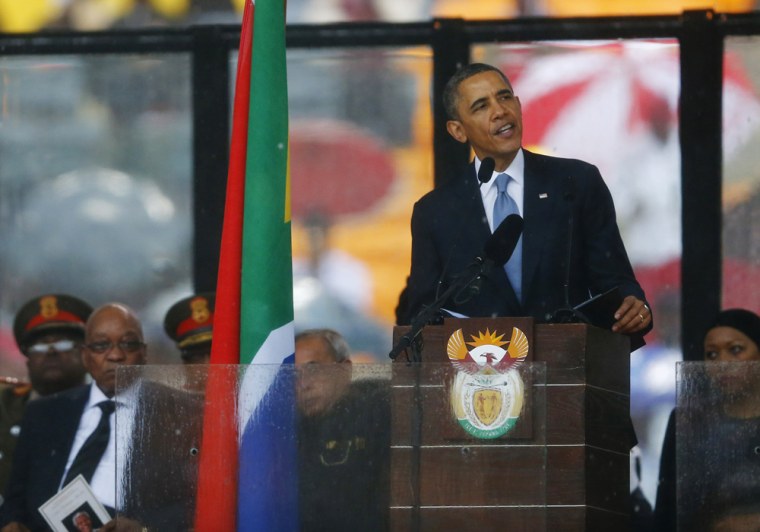President Barack Obama challenged South Africa and the world on Tuesday to apply the immortal example of Nelson Mandela and lift children from poverty, spread freedom of belief and overcome inequality and cynicism.
Invoking Gandhi, Martin Luther King and the American founding fathers, the president spoke of Mandela as “the last great liberator of the 20th century” — a man who, after emerging from prison, held his country whole without taking up arms.
But the president used much of his eulogy, delivered before tens of thousands of people in Johannesburg in a pouring rain at the largest stadium on the African continent, as a call for the living to act in the name of justice and peace.
“After this great liberator is laid to rest, when we have returned to our cities and villages, and rejoined our daily routines, let us search then for his strength — for his largeness of spirit — somewhere inside ourselves,” Obama said.
Obama, like Mandela the first black president of his country, spoke of himself and his wife as direct beneficiaries of the struggle of Mandela, the giant of the anti-apartheid movement, who died last week at age 95.

But in both the United States and South Africa, the president said, progress must not obscure the work yet to be done.
“With honesty, regardless of our station or circumstance,” Obama said, “we must ask: How well have I applied his lessons in my own life?”
He continued: “Around the world today, we still see children suffering from hunger and disease. We still see run-down schools. We still see young people without prospects for the future. Around the world today, men and women are still imprisoned for their political beliefs, and are still persecuted for what they look like, and how they worship, and who they love. That is happening today.”
Obama said that Mandela’s greatest gift, whether inborn or honed over 27 years in his prison cell, was a recognition that all humans are bound together, and reach their potential only by caring for others.
“It took a man like Madiba,” Obama said, invoking Mandela’s clan name, “to free not just the prisoner, but the jailor as well, to show that you must trust others so that they may trust you, to teach that reconciliation is not a matter of ignoring a cruel past, but a means of confronting it with inclusion, generosity and truth.”
“He changed laws,” the president said, “but he also changed hearts.”
Obama was interrupted repeatedly by cheers inside the stadium. At a separate facility outside, where screens were set up for the overflow crowd, Prince Adebayo, 37, a businessman, said that Obama’s speech was good.
“Obama looks at Mandela as his hero,” he said. “I listened to what he said. He said he wants to follow in the steps of Mandela. That’s why people are excited.”
Eddie Akinrinbola, 45, who is from South Africa and lives in Dublin, said that he came to South Africa specifically for the memorial.
“He is a very good man. He speaks about human rights. Everybody loves Obama,” he said. “People love Obama because he is a black American in the White House.”
Obama was the first of six foreign dignitaries to eulogize Mandela. He followed by Dilma Rousseff, the president of Brazil, then by the vice president of China, the presidents of Namibia and Indian, and President Raul Castro of Cuba.
Obama was joined at the service by three of his predecessors — Jimmy Carter, Bill Clinton and George W. Bush. Dignitaries at the stadium, representing more than 90 countries, were protected by bulletproof glass.
It was only the second time that four American presidents have been together overseas. The first was in February 1999, for the funeral of King Hussein of Jordan, when Carter, Gerald Ford, George H.W. Bush and the sitting President Clinton traveled to Amman.
Ghazi Balkiz of NBC News contributed to this report.
Related:
Nelson Mandela memorial: 'The world has lost a beloved friend and mentor'
Obama shakes hands with Cuba's Castro at Mandela service